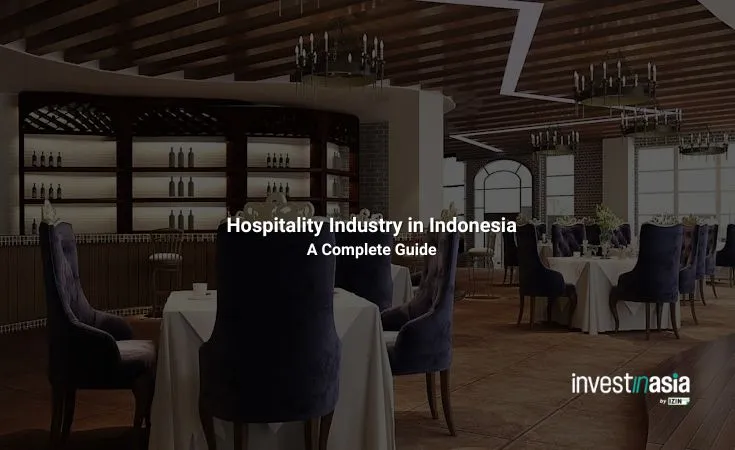Indonesia’s hospitality industry is one of the strongest pillars of its economy, blending tourism growth, cultural richness, and investor appeal. The sector is forecast to generate over $29 billion by 2025, driven by international arrivals, expanding infrastructure, and the government’s push for sustainable tourism.
For investors and entrepreneurs, this industry offers enormous opportunities—provided they understand the regulatory, financial, and operational landscape.
Market Overview and Growth Potential


Tourism fuels Indonesia’s hospitality boom. Over 15 million foreign arrivals in 2024 marked a solid recovery, especially from key markets like Australia, China, and India. Hotels, resorts, and villas are expanding beyond Bali into emerging destinations such as Labuan Bajo, Mandalika, and Lake Toba.
The hotel segment alone is expected to grow at 13.5% annually through 2030, reflecting strong demand in both leisure and business travel.
Also read: Tourism Industry in Indonesia: Outlook and Opportunities
Key Sectors in the Ecosystem
- Hotels & Resorts: Ranging from budget to luxury, with Bali leading in premium resorts.
- Eco-tourism: Focus on sustainability, particularly in Lombok and Sumatra.
- Urban Hospitality: Business hotels in Jakarta and secondary cities catering to MICE events.
- Villas & Short-term Rentals: Strong demand among digital nomads and long-stay tourists.
- Food & Beverage: Integrated into most hospitality ventures, requiring separate licenses.
Advantages of Investing in Indonesia’s Hospitality Sector
- High Growth Trajectory: Revenue and user base projections remain positive through 2030.
- Government Support: Infrastructure projects and simplified licensing via OSS system.
- Strategic Geography: Proximity to Australia and Asia-Pacific makes Indonesia a tourism hub.
- Diverse Market Segments: From luxury travelers to budget-conscious backpackers.
- Sustainability Demand: Green Hotels and eco-tourism align with global traveler preferences.
Challenges Investors Must Consider


While opportunities are vast, challenges persist:
- Rising operational costs for staff, energy, and supplies.
- Complex regulatory environment, requiring multiple licenses.
- Seasonality in tourist arrivals, especially in leisure markets like Bali.
- Skills gaps in digital transformation and workforce readiness.
Government Support and Future Projections
Indonesia’s “10 New Balis” initiative aims to reduce dependency on Bali and spread tourism benefits nationwide. Coupled with improved airports, toll roads, and ports, this initiative is expected to boost demand for hotels and hospitality services in secondary destinations.
By 2030, the hotel industry is projected to reach $9.92 billion, supported by online booking penetration and emerging niches like wellness tourism, gastronomy, and digital nomad-friendly accommodations.
Also read: What is the Richest State (Province) in Indonesia for Business?
Regional Comparison
- Bali: Leisure-focused, luxury-driven, high seasonal swings but premium pricing.
- Jakarta: Corporate demand, steady ADR, strong MICE segment.
- Emerging Destinations: Labuan Bajo, Mandalika, Lombok—ideal for early movers seeking growth.
Also read: Top Questions Foreigners Ask Before Registering a Business in Indonesia
How Foreigners Can Start a Hospitality Business in Indonesia
Foreigners can legally enter the hospitality sector through PT PMA company registration. The steps include:
- Registering for a Business Identification Number (NIB) via OSS.
- Securing a Tourism Business License (TDUP).
- Meeting minimum capital requirements of IDR 10 billion per business line.
- Applying for hospitality-specific licenses such as hotel classification or villa permits.
This process requires expertise to ensure compliance and smooth establishment.
Also read: How to Set Up PMA Company in Indonesia: Guide for Foreigner
How InvestinAsia Can Help You
Setting up a hospitality business in Indonesia is promising but complex. From understanding PT PMA rules to securing the right permits, foreign investors often face delays and high risks if they navigate alone.
InvestinAsia simplifies this process through our Indonesia Company Registration Service. With local expertise and regulatory knowledge, we ensure your hospitality venture complies with all requirements—so you can focus on operations and growth.
We also provide other services such as:
- PMA registration in Indonesia (Foreign Company)
- Representative office registration in Indonesia
- Indonesia Local PT PMDN Set Up
- Indonesian Virtual office setup
- Business registration number in Indonesia
- Business Licenses in Indonesia
- Trademark Registration in Indonesia
- Franchise License in Indonesia
If you are interested in starting a business in Indonesia without hassle, you can start by contacting us for FREE consultation.
FAQs
Can foreigners fully own a hotel in Indonesia?
Yes, hotels rated two stars and above can be 100% foreign-owned under a PT PMA structure.
What is the minimum investment for a foreign-owned hospitality business?
At least IDR 10 billion per business line, excluding land and buildings.
Do I need a separate license for restaurants or bars within a hotel?
Yes, separate licenses such as restaurant permits and alcohol licenses (SIUP-MB) are required.
Which destinations outside Bali are promising for investors?
Labuan Bajo, Mandalika, Lake Toba, and Lombok are growing rapidly due to government promotion.
How does the Green Hotel Program benefit operators?
It reduces costs, increases occupancy rates, and enhances brand reputation among eco-conscious travelers.




